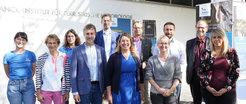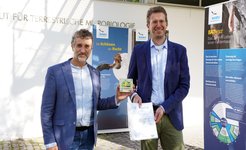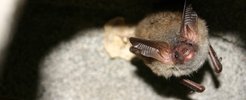Bats welcome
MPI for Terrestrial Microbiology awarded "Bat-Friendly House" from Naturschutzbund (NABU) Hessen
During the remodeling of a former greenhouse into laboratories, bat-friendly elements were installed in an exemplary manner. For this the NABU Hessen awarded the Max-Planck-Institute in Marburg the title "bat-friendly building".

The award ceremony took place at the Max Planck Institute for Terrestrial Microbiology on the Lahnberge in Marburg as part of the "Bat Friendly House" campaign.
"NABU is very pleased that the Lower Nature Conservation Agency, the architect's office and the Max Planck Institute worked hand in hand during the conversion of the greenhouse to create a gain for biodiversity in the area and integrated retreats for insects and bats with so much expertise. Public and commercial buildings such as this institute are excellent objects for bat conservation, which can also draw people's attention to the lack of housing for bats," said Mark Harthun, nature conservation officer of NABU Hesse.

The project was made possible by the conversion of the institute's former greenhouses into laboratory space, which will house Prof. Helge Bode's department in the future. In close cooperation with the Nature Conservation Agency of Lower Saxony and the architects Schmidt and Strack, who supervised the construction work, bat boxes were integrated into the facade of the building, thus making an important contribution to the survival of the endangered bats.
Dr. Katharina Höfer. leader of MPI Marburg`s “Green Team” presented several projects of the Sustainability Group aimed at making research more climate-friendly and sustainable. In particular, she highlighted the fruitful collaboration with the MPG's construction department and construction coordinator Janina Klein on measures to promote biodiversity in the immediate vicinity of the institute. "With its "Bat Friendly House" campaign, the German Society for Nature Conservation (BUND) honors private and public homeowners who create or promote existing roosts for bats in their buildings. Unfortunately, natural roosts such as tree holes are becoming increasingly rare. Most of the bat species found in Hesse are even building dwellers and find less and less suitable roosts due to renovations and insulation measures. They are therefore dependent on roosts in the human environment.

NABU hopes that the MPI's commitment will be emulated by many in the commercial and public sectors of large cities. "Companies, public institutions or churches that offer bats a habitat quickly realize that an incredible amount can be achieved for these fascinating and endangered animals with little money. At the same time, bats are frugal and uncomplicated tenants. A commitment to these friendly animals can quickly become a real image boost for any institution," says Petra Gatz, project manager for the Bat Friendly House at NABU Hesse. Those who, like the MPI, install insect-friendly green roofs and nesting aids on their premises ensure that the bats not only find an attractive home, but also a richly laid table.
Background to the Award "Bat-friendly house"
NABU not only awards bat-friendly houses, it also advises interested homeowners on renovations and assistance measures for the agile night hunters. Because the support of the nocturnal flyers contributes immensely to the protection of this fascinating but unfortunately threatened group of animals. This has also been recognized by the campaign's cooperation partner, the Hessian State Agency for Nature Conservation, Environment and Geology (HLNUG), where the campaign has received great support from the very beginning.
"Bats are very pleasant lodgers, make no noise and cause no damage to the building fabric. Only small droppings betray their presence on the house. However, these are considered excellent plant fertilizer," says Gatz. Bats also bring homeowners some benefits. For example, they exterminate up to 4,000 mosquitoes per night and show where the living environment is still intact.
Installing bat roosts is also easily accomplished during home renovation work. In addition, there are now a large number of modules and installation blocks that can be integrated into facades under plaster and are visually unobtrusive. Just a few measures are enough to help the fascinating flying mammal.
In the "Bat-friendly house" campaign, the nature conservation association honors private and public homeowners who install bat roosts on their buildings or promote existing ones. Unfortunately, bats now have fewer and fewer natural hiding places such as tree cavities at their disposal. The majority of bat species found in Hesse even inhabit buildings and find fewer and fewer suitable roosts due to renovation and insulation measures. Therefore, they depend on roosts in the human environment. In Hesse, there are already more than 1,380 bat-friendly houses, including the Marburg Castle, the Jugendburg Hessenstein, the Stadthaus Lorsch, the Schlosshotel Wolfsbrunnen, the Kassel Workshop and the Zehntscheune Züschen.
Source: Press release of "Bat-friendly house" campaign, Kathrin Kaltwaßer/NABU Hessen














